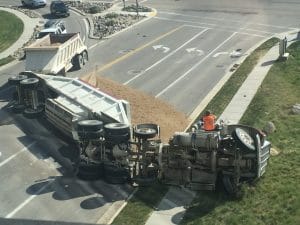What Evidence Can Help Prove I’m Not at Fault for a Truck Accident?
 Trucking accidents are a frequent occurrence all across the country. Transportation companies often worry about their bottom line, which includes insurance costs. Liability leads to increased expenses for the company and driver, so it stands to reason that trucking companies aren’t quick to accept responsibility for damages or injuries.
Trucking accidents are a frequent occurrence all across the country. Transportation companies often worry about their bottom line, which includes insurance costs. Liability leads to increased expenses for the company and driver, so it stands to reason that trucking companies aren’t quick to accept responsibility for damages or injuries.
Victims driving passenger vehicles involved in trucking accidents often find it frustrating to deal with the insurance companies because they’re not interested in rushing to a conclusion and paying out claims. If you were injured and/or your vehicle sustained serious damage, your best bet to move things along is to find as much evidence of the truck driver’s guilt as possible.
Memorializing accident evidence may be done by multiple sources
When an accident happens, most people are stunned that they’ve been hit. When a large truck is involved, you may be too injured to even move, much less think to exit your vehicle and take photos of the scene and damage. Police will conduct an initial investigation on the scene and depending upon how bad the crash is, there may be specialized accident investigators from both law enforcement, the transportation company, and government agencies involved in collecting evidence.
Investigations are likely to include:
- Local or state police, depending upon the location of the accident.
- An accident scene reconstruction investigator who can use the available evidence to piece together how the accident occurred and offer potential causes.
- The trucking company’s attorneys, who are looking to garner any advantage to assemble a defense and deflect liability.
- Insurance companies from all involved drivers.
- National Highway Traffic Safety Administration and other governmental agencies, including the Federal Motor Carrier Safety Administration all may conduct investigations depending upon the type of truck involved and severity of the accident.
What evidence do they collect that can help?
Police reports showing the truck driver to be at fault can be a good start to building your case against the truck driver and that you did nothing wrong. That said, police reports can be challenged so having as much evidence stacked in your favor to show you’re truly the victim will be in your best interest.
Vehicle inspections
If your vehicle and the truck are both examined by qualified mechanics who can state that your vehicle was sound and the truck displayed mechanical failures, it can help to explain how the truck lost control. Liability may lie with both the driver and transportation company, or even the manufacturer if there was a parts defect.
Tire mark measurements
These can help to tell the story of where your vehicles were when the crash occurred and whether either vehicle attempted to brake. Often when trucks don’t brake during accidents, it’s a tell-tale sign of a fatigued truck driver.
Liquids and oils
Investigators look for these substances on the ground to help determine braking and speed based on their distance and angle from the vehicle they came from. This is to determine if either of the vehicles braked. Also, for their speeds of motion when they applied the brakes.
Witness statements in your favor
Statements by anyone who saw the accident occur and can definitively state that the truck was in the wrong will help bolster your claim.
Photos of vehicle damage
This can help piece together how the vehicles collided, which may be able to show which vehicle made first contact. In combination with the location of the vehicles and other evidence, this can be helpful in proving the truck crossed into your lane, was speeding, or engaged in any number of negligent driving behaviors.
Video footage
Today it feels like there are video cameras everywhere. Depending upon where your accident occurred, there may be traffic or security cameras that contain video evidence showing exactly what happened. Many personal vehicles even have portable dash cams installed to capture footage in the event of a collision. This evidence can be examined by experts who can assess different angles available to help determine who initiated the crash.
Electronic Control Module (ECM)
An ECM is the trucking equivalent to a black box. It records all relevant information from the truck’s operating systems and can be a significant source of evidence that the truck driver was careless, or the truck was defective. Information that can be obtained includes engine performance such as RPMs, speed, and brake application.
The Oklahoma City truck crash attorneys at Cunningham & Mears understand trucking industry regulations and the methods used to minimize liability of its drivers and companies who cause harm to other drivers and passengers. Our experienced personal injury attorneys will fight to win you a fair settlement to compensate you for the injuries you’ve sustained from the negligence that runs rampant in the trucking industry. To schedule your free case evaluation with a member from our team, call 405.451.4029 today or we invite you to reach out to us through our contact form.

Ryan Y. Cunningham is a founding partner of Cunningham & Mears. Mr. Cunningham devotes his practice to protecting the rights of injured Oklahoma residents. In addition to assisting injured clients, Mr. Cunningham endeavors to improve personal injury representation by speaking on issues related to personal injury law to attorneys in continuing legal education courses and to law students. Learn More
